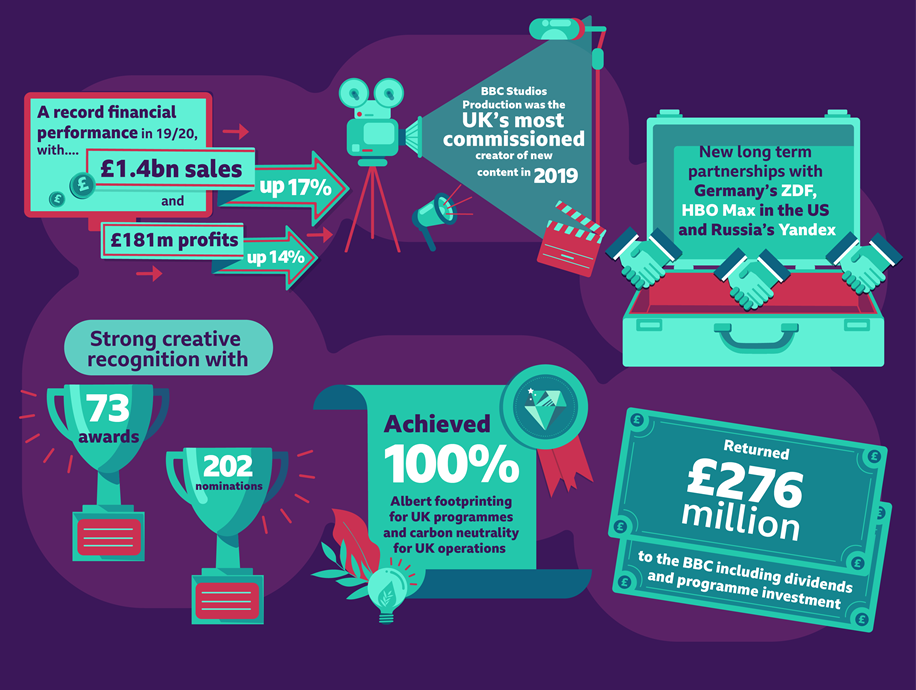![]() By Steve Hawley
By Steve Hawley
The British Broadcasting Corporation is one of the premier public institutions in the UK, running eight television channels that are broadcast nationally and regionally, ten UK-wide radio networks, two national radio services each in Scotland, Wales and Northern Ireland, and 39 local radio stations across England and the Channel Islands. Online, the BBC iPlayer provides an on-demand and catch-up experience on virtually any video-capable device. In its home market, the BBC is funded through the mandatory TV license fee paid by every tv-watching household in the UK.
About BBC Studios
Because producing and maintaining a steady flow of top-tier programming is an expensive proposition, the BBC supplements its license fee income by commercializing its programming for resale around the world through its commercial subsidiary, BBC Studios, Ltd. In effect, it’s the commercial arm of the BBC, and it has a strong global footprint.

Its programming is familiar to American audiences through broadcast (and streaming) by the Public Broadcasting Service, and streaming distribution via Amazon Prime Video, Apple TV, HBO Max, and through BBC Studios’ own subscription-based app, BritBox, which is a joint venture between the BBC and ITV.
Recognizing piracy
Until recently, because piracy was mainly of movies, distributed via P2P file sharing platforms, the UK broadcast industry considered piracy to be a marginal threat that the movie studios were already managing. With P2P, the IP addresses of both the downloaders and the distributors (seeders) can be readily known.
But as in every other part of the world, improved broadband speeds in the UK – coupled with the “instant gratification” factor provided by Netflix and other legitimate streaming services – created the consumer expectation for content immediately. This in turn drove a massive increase in the sharing of VOD content and TV series through streaming. And now, “IPTV” is one of pay TV’s (and the BBC’s) biggest competitors.
Types of piracy and their impact

In a recent conversation, Diane Hamer, Head of Business and Legal Affairs for Content Protection at BBC Studios, detailed several ways that piracy has had an impact. The first is streaming piracy. Direct-to-consumer streaming is an enormous threat to legitimate streaming services, and in the case of BBC Studios, to BritBox. There are seemingly countless illegal streaming services offering free-to-air UK programming to British expats and Anglophiles. One recent takedown success was UKTVEverywhere, a civil action in the US; which began redirecting to BritBox last September.
Whenever the BBC’s programs are broadcast on the BBC’s TV channels, unauthorized uploaders immediately put many of these up on YouTube and other streaming service platforms. To manage takedowns, BBC Studios implements YouTube’s content identification system to remove works directly from that platform, and works with vendors to assist it in the removal of pirated content from other platforms, including cloud hosting providers and cyberlockers.
Piracy threatens licensing models
An issue that the BBC frequently confronts is this: because its channels are broadcast free to air in the UK, pirates consider that these channels and the programmes on them are free for the taking. Pirates are, or pretend to be, ignorant of the fact that these programmes are still protected by copyright.
“In our home territory, because the public has already paid for it, our programming is distributed over free-to-air and digital terrestrial television channels; unencrypted. The thinking seems to be ‘Because the programming is free-to-air, isn’t it free for us to stream?’,” said Ms. Hamer.
“But when that programming is stolen and redistributed globally over the Internet, it undermines our international licensing and distribution models,” she said.
Theft and widespread illegal redistribution through streaming is also a concern for Ms Hamer because licensees pay for exclusivity – and piracy puts pressure on the value of BBC Studios’ global content sales. Hence, people in Ms. Hamer’s team work with YouTube’s Content ID tools to identify infringing content on that platform and work with partners around the world to prevent piracy on other platforms.
Jurisdiction complicates the challenge
The fact that the BBC broadcasts its channels free to air means that technological countermeasures are not always available to it, making piracy more difficult to tackle. An effective anti-piracy response is further complicated in that piracy is most likely to occur outside of the UK jurisdiction.
While the UK has well established and effective site blocking legislation and good case law that has made site blocking a useful tool in the anti piracy toolkit, most piracy of BBC content takes place offshore. Also, while in the UK, broadcasters have a bespoke right to protect their broadcast signals, this is not the case in many other countries. And while the UK has its own, very effective, Police IP Crimes Unit (PIPCU), most pirates stealing BBC content and channels are based outside the UK.
The road ahead
Another piracy issue that’s been getting a lot of industry attention of late has been credential abuse: password sharing and password fraud. “Of all the things we think about, password sharing has admittedly been low on the list,” said Ms. Hamer. “But now with BritBox, I can imagine it may become more of a concern.”












